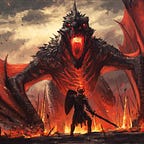The Stories We Share: Creation From Chaos
Chaos is a condition that plagues the human psyche. There’s something about chaos and disorder that people dislike. Unfortunately for these folks, human history is riddled with confusion, mayhem, and destruction. In other words, chaos is constant.
We’re no stranger to chaos. As the world emerges from the worst global pandemic in nearly a century, we confront an economic and mental health crisis. If that wasn’t bad enough, Russia has invaded Ukraine, Taiwan fears they’re next, and global temperatures are rising, spawning unprecedented environmental disasters. It seems the world is a very chaotic place indeed.
But luckily for us, chaos isn’t something to be feared. In fact, the oldest stories of our species suggest that chaos is a necessary force for creation. This is important to us because chaos, and all the destruction and suffering that comes with it, seem to be a constant reality of our world. But we must remember that it is from this chaos that things emerge. For us to act, there must first be chaos.
Mythology and ancient stories across human cultures represent chaos as a necessary force for creation. The necessity of chaos is an idea at the core of humanity, represented in the creation myths of ancient Greece, ancient Mesopotamia, and the ancient Hebrew peoples, along with the creation myths of the Indigenous Haudenosaunee and Aztec peoples. Human stories suggest chaos is essential to the world, with chaos as the necessary precondition for creation and goodness.
First up, ancient Greek mythology speaks of a world before anything, and this world was pure chaos. Interestingly, the Greeks thought this chaos necessarily produces Gaia, the divine spirit of the Earth and mother of all life. This notion of creation coming from chaos is also present in the ancient Mesopotamian myth of the Enuma Elish. This tale speaks of a hero-god, Marduk, who battles the goddess of primordial chaos, Tiamat. The hero-god defeats the chaotic goddess and physically creates the world from her pieces. Biblical mythology shares a similar idea of chaos and creation. In the opening lines of Genesis, the world is said to be a chaotic and formless void from which God then creates the order of our universe. Indigenous mythology of the Haudenosaunee (Iroquois) peoples also speaks of creation coming from chaotic circumstances. The Haudenosaunee creation story speaks of a woman falling from the Sky Islands. After falling to chaos of the Earth and nearly drowning, several animals help the Sky Woman safely on the back of Turtle where the land of our world was grown out of. This conception of creation arising from chaos is also represented in the Aztec mythology of the Mexica peoples. From the void and chaos of nothingness came Ometeotl, the supreme God and creator of the universe. Out of disorder and chaos comes a force for good. These stories all speak of creation coming from chaos, and chaos as a necessity for creation and all the good things of life.
Through Ancient stories and cross-cultural mythology, we learn that chaos is not only a destructive force to be feared, but a condition for creation and goodness. These stories resonate with all cultures because they remind the human being of its sacred purpose when encountering the trials and tribulations of this world.
Ultimately, understanding the human being as a force for creation and goodness when encountering chaos is a common theme shared across all human culture.
There are the stories we share as human beings. These are the stories that move cultures, and create religions. Civilizations are founded on these stories and their mythologies become an eternal testament to the prosperity of the human spirit. This is what’s at the heart of the arts, and the beautiful end of literature, film, and the humanities. This is what stories are in their core, and these are the stories we share.
